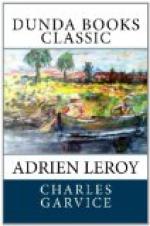She was the only daughter of a widower, a clerk in the employ of a country bank, who, broken-hearted at his daughter’s ruin, threw up his situation, changed his name to that of George Harker, and fled to London with his beloved child. Here he found it extremely difficult to obtain work. His savings soon evaporated, and alas! further trouble was in store for him; for one afternoon a smooth-faced gentleman appeared at their quiet lodgings. This was none other than Jasper Vermont, who in a long private interview with the unhappy Harker informed him that he had heard of Lucy’s escapade, and threatened to proclaim her shame, if Mr. Harker failed to comply with a proposition he was about to make to him. The business which he suggested was one entirely abhorrent to the ex-bank clerk; but with money running short, and the thought of his daughter’s misery should her secret be revealed, what could the father do but submit?
The result of this interview was that, a month or two later, a new moneylending firm sprang up in a narrow street in the city, under the title of Harker’s Ltd., and none of the numerous clients who patronised it ever recognised that the manager, Mr. Harker, was speaking the literal truth when he repeatedly asserted his own impotence in the business. Every one believed the story to be a fictitious one, invented to assist him in his extortions.
Time passed on, and Lucy’s pretty face and modest ways, perhaps her very sadness, which clung to her in never-ending remorse, caught the heart of a simple-minded man, one John Ashford. He was a flourishing grocer in a village on the banks of the Thames, and was then staying in London on a visit. After a hard struggle with herself the poor girl returned his love, and ventured to become his wife.
Wilfer, from inquiries made by Mr. Harker, was supposed to be dead. None, she thought, knew her secret except her father, for Lucy believed that Vermont had employed Mr. Harker out of friendship and sympathy, and did not know until long after her marriage that she, and therefore her husband, were in his power. So she ventured to grasp the happiness held out to her, thus strengthening the chain which bound her father and herself in slavery to Jasper Vermont’s will. For if they feared disclosure before, how much more did they dread it now, when Lucy was married to a man who prided himself upon his good name and untarnished respectability!
Johann Wilfer, however, was not dead, nor had he left London. He had become a member of a gang of ingenious rascals, who lived by imitating the less known gems of the old masters, and palming them off on the credulous public and wealthy collectors as genuine. The impostures were very cleverly manipulated, and quite a little system was instituted to bring them to perfection. Mr. Wilfer’s part of the undertaking was “toning”; that is, bringing to the imitations the necessary mistiness and discoloration supposed to be produced by age.




